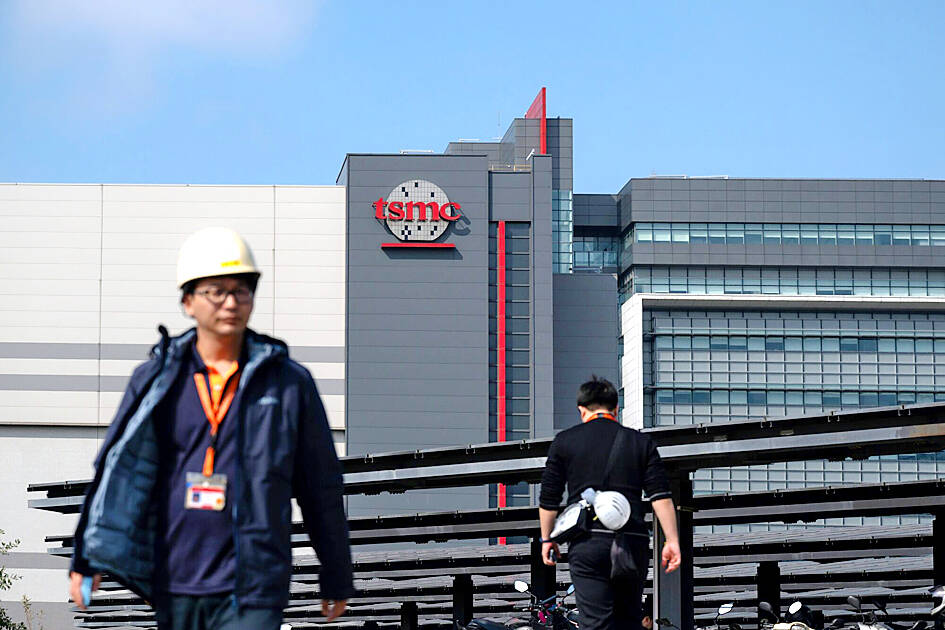Thirty students from the German state of Saxony are to arive in Taiwan in March to receive training in semiconductor manufacturing, visiting Saxony Minister of Science, Culture and Tourism Sebastian Gemkow said in Taipei on Wednesday.
They would be the first group of students to travel to Taiwan under a talent incubation program developed by Taiwan Semiconductor Manufacturing Co (TSMC, 台積電), the Saxony state government and Dresden University of Technology (TU Dresden), Gemkow said in an interview.
The trilateral partnership was established in September last year with the aim of cultivating a skilled workforce in the field of chip manufacturing in the German state, in the wake of TSMC’s announcement it would build a new fab in Dresden, the capital of Saxony.

Photo: Bloomberg
Gemkow said that the students would begin a series of online semiconductor courses next month.
In March, they are to travel to Taiwan, where they would carry on with their courses at local universities, such as National Taiwan University, and undergo training at TSMC’s plants for six months, said Gemkow, who arrived in Taipei on Tuesday for a three-day visit.
In the long run, more German students from TU Dresden and other universities in Saxony who are interested in semiconductors would travel to Taiwan, the official said, adding that the Saxon Science Liaison Office in Taiwan, inaugurated in September last year, has been working around the clock on this endeavor.
TSMC senior vice president of human resources Lora Ho (何麗梅) said the firms hopes that 100 German students specializing in science, technology, engineering or mathematics would be sent to Taiwan as part of the program each year.
In August last year, TSMC announced plans to build a 12-inch wafer fab in Dresden to produce automotive chips as part of a joint venture with Bosch, Infineon Technologies and NXP Semiconductors.
Total investment is expected to exceed 10 billion euros (US$10.9 billion), with the German government promising to provide 5 billion euros in subsidies.

Sweeping policy changes under US Secretary of Health and Human Services Robert F. Kennedy Jr are having a chilling effect on vaccine makers as anti-vaccine rhetoric has turned into concrete changes in inoculation schedules and recommendations, investors and executives said. The administration of US President Donald Trump has in the past year upended vaccine recommendations, with the country last month ending its longstanding guidance that all children receive inoculations against flu, hepatitis A and other diseases. The unprecedented changes have led to diminished vaccine usage, hurt the investment case for some biotechs, and created a drag that would likely dent revenues and

Macronix International Co (旺宏), the world’s biggest NOR flash memory supplier, yesterday said it would spend NT$22 billion (US$699.1 million) on capacity expansion this year to increase its production of mid-to-low-density memory chips as the world’s major memorychip suppliers are phasing out the market. The company said its planned capital expenditures are about 11 times higher than the NT$1.8 billion it spent on new facilities and equipment last year. A majority of this year’s outlay would be allocated to step up capacity of multi-level cell (MLC) NAND flash memory chips, which are used in embedded multimedia cards (eMMC), a managed

CULPRITS: Factors that affected the slip included falling global crude oil prices, wait-and-see consumer attitudes due to US tariffs and a different Lunar New Year holiday schedule Taiwan’s retail sales ended a nine-year growth streak last year, slipping 0.2 percent from a year earlier as uncertainty over US tariff policies affected demand for durable goods, data released on Friday by the Ministry of Economic Affairs showed. Last year’s retail sales totaled NT$4.84 trillion (US$153.27 billion), down about NT$9.5 billion, or 0.2 percent, from 2024. Despite the decline, the figure was still the second-highest annual sales total on record. Ministry statistics department deputy head Chen Yu-fang (陳玉芳) said sales of cars, motorcycles and related products, which accounted for 17.4 percent of total retail rales last year, fell NT$68.1 billion, or

In the wake of strong global demand for AI applications, Taiwan’s export-oriented economy accelerated with the composite index of economic indicators flashing the first “red” light in December for one year, indicating the economy is in booming mode, the National Development Council (NDC) said yesterday. Moreover, the index of leading indicators, which gauges the potential state of the economy over the next six months, also moved higher in December amid growing optimism over the outlook, the NDC said. In December, the index of economic indicators rose one point from a month earlier to 38, at the lower end of the “red” light.